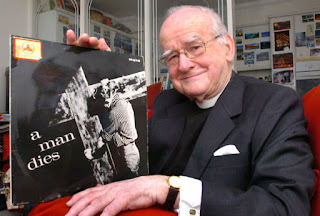It began in Bristol U.K. "A man dies" and "Jesus Christ Superstar"
 |
| Earnest Mrvin |
I was a sixteen years old member of the Plymouth Brethren Church back in those days, so I most likely disapproved of "A Man Dies" . We, (the Plymouth Brethren), disapproved of everything!
-----------------------------------------------------------------------------------------------------------------------------
I had forgotten all about "A Man Dies" until earlier today when saw these pictures on the "Bristol, Then and Now" Facebook page.
 |
| St. James Presbyterian Church, Lockleaze, Bristol |
The Bristol Then and Now page includes the following commentary:
Lockleaze, Bristol -
'Jesus Christ Superstar' began at St.James (Presbyterian) Church on Romney Avenue soon after it replaced the disused Presbyterian Church on St James Parade, Haymarket in 1953.
The world famous Rock Opera, was conceived in 1960 when the incumbent Reverend Ernest Marvin opened up the church to Rock'n'Roll with his controversial play, ‘A man Dies’.
It went on to be performed at the Colston Hall amidst intense pressure from Church Leaders, Politicians and the Press alike, who described the play as "blasphemous", and demanded (unsuccessfully) that it should be banned.
West End writers finally realised its potential and so by 1970 ‘Jesus Christ Superstar’ had been created! The Reverend Ernest Marvin died in July this year
Here is a bit more (from a Flikr page, by Paul Townsend).
Note that as recently as 1966 the Lord Chamberlain was the unelected and all powerful Censor in the U.K.


Comments
Post a Comment